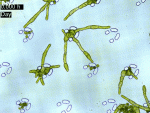
Herein, we present the design of a comprehensive, physiologically relevant, easy-to-use and low-cost microfluidic and microscopic setup for the monitoring of Physcomitrella patens (P. patens) growth and development on a long-term basis. The experimental solution we developed is made of two parts (i) a microfluidic chip composed of a single layer of about a hundred flow-through microfluidic traps for the immobilization of protoplasts, and (ii) a low-cost, light-controlled, custom-made microscope allowing the continuous recording of the moss development in physiological conditions. We validated the experimental setup with three proofs of concepts: (i) the kinetic monitoring of first division steps and cell wall regeneration, (ii) the influence of the photoperiod on growth of the protonemata, and (iii) finally the induction of leafy buds using a phytohormone, cytokinin.

Press release available :
in french : Quand la microfluidique observe le développement cellulaire des plantes !
Reference :
K. Sakai, F. Charlot, T. Le Saux, S. Bonhomme, F. Nogué, J.C. Palauqui*, J. Fattaccioli*.
Design of a microfluidic and microscopic toolbox for the ultra-wide spatio-temporal study of plant protoplast development and physiology.
Plant Methods, 15 : 79 (2019) [doi]
